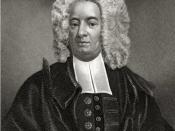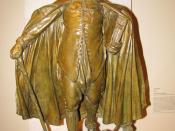In "The Europeans", the Americans (symbolized by the Wentworths) are Puritans who abide by strict Puritan rules, which promote the Puritan way of life. The Europeans, on the other hand (symbolized by Eugenia and Felix), are not Puritans but are sophisticated, opportunistic, and sometimes lax in their way of life. This sometimes causes confusion and conflict when their lives are enmeshed. But it also sometimes brings about an understanding, respect, tolerance and appreciation of one another's beliefs, values, cultures and opinions.
In the American culture, James appreciated the 'good', which we associate with the moral earnestness of the Puritans; in the older European culture he admired the life lived, not in terms of moral ideas, but of aristocratic style. The most important theme of his novel, called "The International Theme" emerges in a portrayal of the relationship or clash between these two cultures.
James was interested in the moral perceptions of the characters - perceptions which emerged as a result of bringing together the two cultures, the one with its apparent naivety or cultural innocence, the other, with its wider experience and sophistication that verged on decadence.
The author is not severely criticising European values, or American values. James is not 'taking sides'. The author is able to direct gentle satire at European sophistication as well at the 'stiffness' of the Americans. The European characters Eugenia and Felix embody a highly refined form of opportunism. They become involved with a group of Americans who embody the more conservative quality of discipline. The opposition between opportunism and discipline is a central idea that gives the novel its dramatic unity. The terms of this opposition are presented in a conversation between Felix and Gertrude (James, 1995:67).
Mr Wentworth confides in Felix telling him about his son being suspended for drinking (James,


